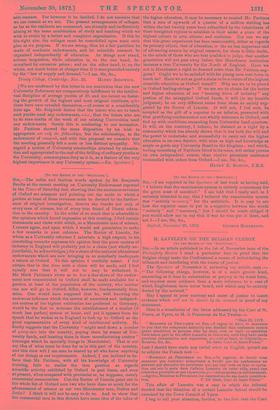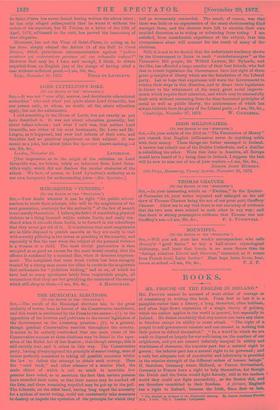M. LAVELEYE ON THE BELGIAN CLERGY. [TO THE EDITOR OF
THE "SPECTATOR."] SIR,—In an article published in the let of November issue of the Fortnightly Review I cited a particular fact in proof that the Belgian clergy make the Confessional a means of intimidating the tribunals and interfering with the course of justice.
The Spectator of November 9, reviewing my article, says :— "The following charge, however, is of a much graver kind,
amounting as it does to subornation or perjury in its worst form, and requires more evidence than a were reference to a case of which Englishmen have never heard, and which may be entirely denied by the accused."
May I appeal to your courtesy and sense of justice to insert evidence which will not be denied by the accused in proof of my
statement.
Here is a translation of the letter addressed by the Curd of St. Pierre, at Ypres, to M. le Procureur du Roi Tweins
"Mars 22, 1872.
"MONSIEUR LE Paocrazux nu Ror,—I regret to have to announce to you that the competent authority has decided that confessors cannot grant absolution to persons who by their vote or their co-operation have taken part in the affair Latnotte in this town, until they have made previous retractation and reparation, pro ralci at least, or conjointly.— Receive, Sir, eke., Ds Sian; Cure de Saint-Pierre."
Lest I should have made any verbal error in English, permit me to subjoin the French text :— MONSIEUR LE PROCUREUB DU Rot,—Jo regrette de devoir yowl annoncer quo l'autorite competente a decide quo les confesseurs no peuvent pas absoudre lee personnes qui, par leur vote on lour co-opera- tion, out mis la main dans l'affaire Lamotte de cotta vile, avant ime retraction prealable et ttne reparation, pro read au moins, on solidairetnent. —Agrees., Monsieur le Procurear, les expressions de ma haute considera- tion, P. DE &km, Cure de Saint-Pierre."
This affair of Lamotte was a case in which the tribunal decided that the direction of a certain Lamotte School should be exercised by the Town Council of Ypres.
I beg to call your attention, further, to the fact that the Curd de Saint-Pierre has never denied having written the above letter ; he has only alleged subsequently that he wrote it without the orders of his superiors, but M. Tweins, in a letter of the 18th of April, 1872, addressed to the cure, has proved the inaccuracy of that allegation.
Moreover, has not the Vicar of Saint-Pierre, in acting as he has done, simply obeyed the Article 14 of the Bull In Comet Domini, which pronounces excommunication against "judices seculares qui eecksiasticas personas ad sea tribunalia trahunt?" However that may be, I have said enough, I think, to obtain acquittal from an English jury of the charge of having cited a case without sufficient proof.—I am, Sir, &a.,



































 Previous page
Previous page